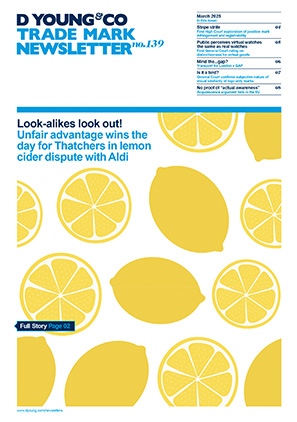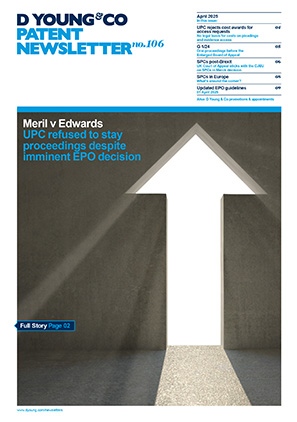Military Mutual v Police Mutual: Extended Passing Off
In the United Kingdom, the law of passing off fills the gap in intellectual property protection afforded by registered rights usually filled by unfair competition in civil law jurisdictions. While narrower than unfair competition, it has proved a flexible law, developing from ‘traditional’ passing off to include ‘extended’ passing off. As a result, in recent years it has covered names associated with a particular type of product (as opposed to a single trader or corporate group), including champagne, sherry, advocaat, whisky, vodka, Swiss chocolate and Greek yogurt. In The Military Mutual v Police Mutual Assurance Society & Others, the English Intellectual Property Enterprise Court has explored the limits of this doctrine.
Here, both the claimant and defendants provided insurance services, the former to army personnel and the latter primarily (but not exclusively) to police personnel. The Military Mutual was established in 2016, with Police Mutual Assurance Society being the successor company to an association established in 1866.
The dispute turned on the use of the term ‘mutual’. The Military Mutual asserted that the term describes an organisation with, among other things, a particular type of ownership structure which confers certain benefits on its customers. It reasoned that it benefited from the goodwill in the term and that, by using the term, the Police Mutual Assurance Society and the other defendants were making a misrepresentation as a result of which the goodwill was damaged.
Police Mutual Assurance Society operated as a friendly society under the Friendly Societies Act 1992, with a structure where, if a member of the police force purchased one of its products, it could become a member. However, it and/or its subsidiary(ies), trading under the brand Forces Mutual, also provided insurance (and other financial products) to military personnel. As the judge, His Honour Judge Hacon, explained, Military Mutual alleged that “... because of the way they trade[d], Forces Mutual [were] not mutual entities. This is because they [did] not allow those customers who [were] members of the armed forces to become members and part owners either of Forces Mutual or of the company which control[led] them, [Police Mutual Assurance Society].”
In Erven Warnink Besloten Vennootschap v J. Townend & Sons (Hull) Ltd [1979] A.C. 731, Lord Fraser, with an eye to extended passing off, characterised it as follows:
“It is essential for the plaintiff in a passing off action to show at least the following facts:- (1) that his business consists of, or includes, selling in England a class of goods to which the particular trade name applies; (2) that the class of goods is clearly defined, and that in the minds of the public, or a section of the public, in England, the trade name distinguishes that class from other similar goods; (3) that because of the reputation of the goods, there is goodwill attached to the name; (4) that he, the plaintiff, as a member of the class of those who sell the goods, is the owner of goodwill in England which is of substantial value; (5) that he has suffered, or is really likely to suffer, substantial damage to his property in the goodwill by reason of the defendants selling goods which are falsely described by the trade name to which the goodwill is attached." (Emphasis added.)
With regard to a clearly defined class of goods, Lord Diplock said in the same case:
“Of course it is necessary to be able to identify with reasonable precision the members of the class of traders of whose products a particular word or name has become so distinctive as to make their right to use it truthfully as descriptive of their product a valuable part of the goodwill of each of them; but it is the reputation that that type of product itself has gained in the market by reason of its recognisable and distinctive qualities that has generated the relevant goodwill. So if one can define with reasonable precision the type of product that has acquired the reputation, one can identify the members of the class entitled to share in the goodwill as being all those traders who have supplied and still supply to the English market a product which possesses those recognisable and distinctive qualities.”
It, therefore, fell to Military Mutual to show that the term “mutual” was such that it identified with reasonable precision a particular business structure. His Honour Judge Hacon held as follows:
“In my view the evidence as a whole showed that in April 2016 most of the relevant public had some notion of what a mutual is, though not the same notion in every case. The term conveyed something positive to them. It is likely that some believed that a mutual has no shareholders, though it is hard to say what proportion.
The evidence did not support a belief that financial mutual are invariably owned by some or all of their customers. Indeed, that is not always the case. It did not support the suggestion that the relevant public have two distinct understandings of the term 'mutual'. 'Mutual' was given only the one broad meaning. If there were members of the armed forces who in April 2016 thought that financial mutuals are always owned by some or all of their customers, this would have been seen as nothing more than a general pattern thus far among mutuals. It would not have influenced their understanding of the term 'mutual'.
Moreover, to the extent that when used in the context of a financial organisation 'mutual' implied anything about its ownership, the understanding would have been hazy because it would not have mattered much to the relevant public.
…
The evidence does not support [Military Mutual’s] claim to collective goodwill held by that class because the public did not in April 2016 recognise any such class as being distinct. The term 'mutual' had not acquired a narrow meaning used to define the ownership structure of that class. I do not accept that any significant part of the public held the belief that that in the context of financial organisations 'mutual' meant that it must be owned solely by all or some of its customers. In my view the shared goodwill asserted by MML did not exist.”
For this, and other reasons, Military Mutual’s claim failed. For brand owners and those providing regulated products and services, the case serves to demonstrate the limits of extended passing off; in particular, the need to have a clearly defined class of goods or services.
The Military Mutual v Police Mutual Assurance Society & Others - full decision
Link to full decision:
Bailii decision: Military Mutual v Police Mutual
